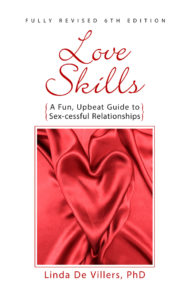Narcissism and Relationships
If a narcissist is part of your life—as a spouse, partner, lover—you may need a game plan to survive. Dr. Linda De Villers, author of author of Love Skills and Simple Sexy Food, joined Dr. Diana again. This time the two friends and sex therapists spoke about overt and covert narcissism in men. The overt narcissist is more extraverted; perhaps he needs to be the center of attention or maybe he’s an entitled playboy. The covert narcissist is more introverted; he is more subtle, but still craves admiration and importance.
What about childhood influences? A solid sense of self is the bedrock for life. Freud theorized—and modern research has confirmed—that this sense of who you are develops between the ages of one and three. That’s when the small child comes to understand that he is important, but not the center of the universe. If a parent is too indulgent or self-absorbed to give what is needed, the sense of self may be stunted.
Who’s a narcissist? It’s true: most of us act selfishly at times. But we psychotherapists consider a person “narcissistic” when the following kinds of behavior are persistent and pervasive: shamelessness, entitlement, arrogance, exploitation, and poor boundaries.
How about living with a narcissist? Good relationships are based on reciprocity: you listen attentively and empathetically to the other person’s joys and sorrows, and vice versa. With a narcissist, it’s a one-way street. Researchers have found that narcissism is closely tied to perfectionism, making narcissists extremely demanding and hypercritical of others.
What about sexual narcissism? In the bedroom these guys require constant stroking (of the ego, primarily), and they tend not to be generous lovers. Another sign of sexual narcissism in both men and (some) women is a compulsive need for new conquests. He needs praise from lots of women. The narcissist may have trouble working on relationships once they get beyond the first, blissful stage of falling in love. They don’t want to think about improving things; they only want to hear how wonderful they are.
Dr. Linda and Dr. Diana agree that maybe the best way to identify narcissists is how they make you feel. They can be masters at off-loading onto others the emotions they can’t handle, such as their shame, their rage, their inadequacy. It may be hard to stay in a narcissistic relationship for a long time. It’s necessary to realize that no amount of effort on your part is going to fill these narcissists up, to complete them as human beings.
Do you need some expert advice about narcissism and relationships? Go to the Dear Dr. Diana website to submit your question.
Click below to listen to the interview (approx. one hour):




